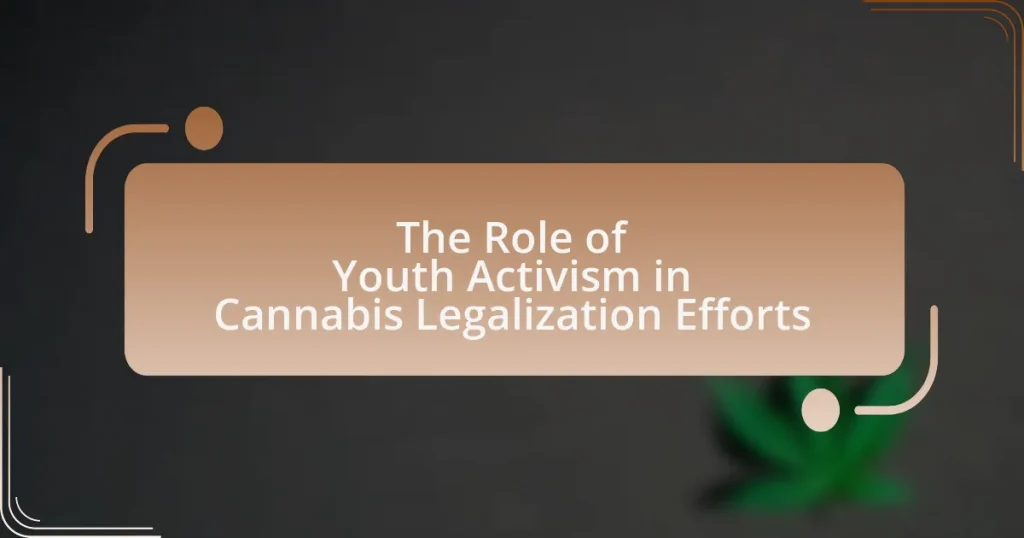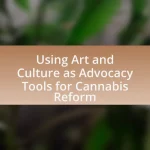Youth activism is a pivotal force in cannabis legalization efforts, significantly influencing public opinion and policy decisions. This article examines the historical impact of youth activism on cannabis reform, highlighting key events and organizations that have mobilized young people to advocate for legalization. It discusses the unique perspectives that youth bring to the conversation, the strategies they employ, and the challenges they face, including legal barriers and societal stigma. Additionally, the article explores how youth-led initiatives and collaborations with other stakeholders have shaped public perception and legislative outcomes, ultimately emphasizing the critical role of young activists in driving change in cannabis policy.
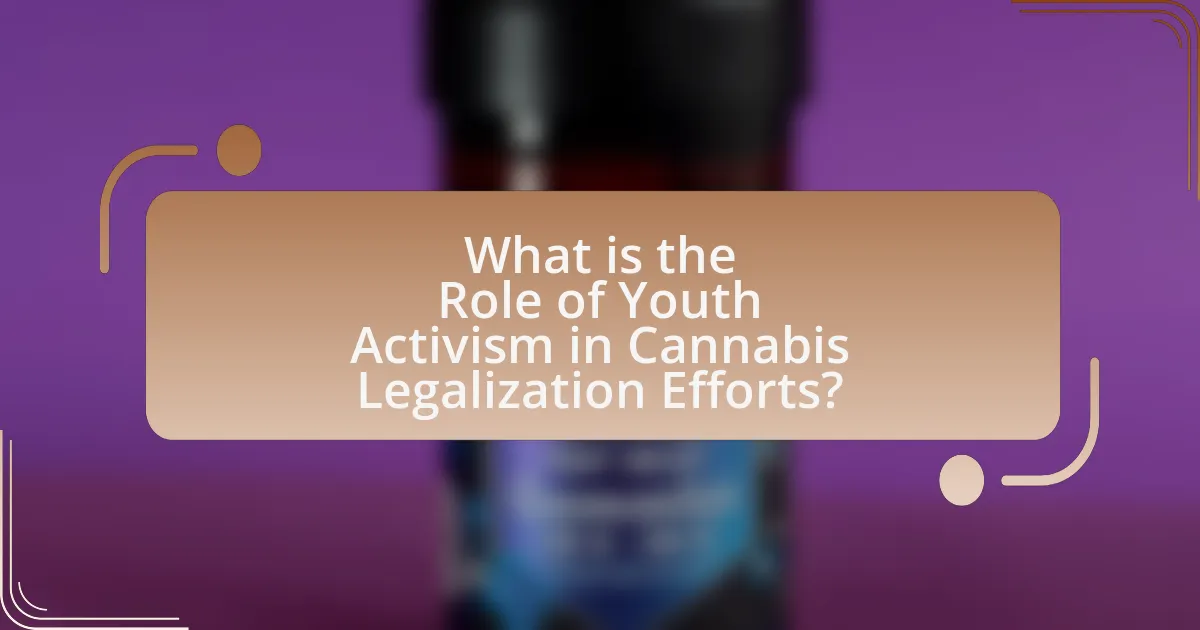
What is the Role of Youth Activism in Cannabis Legalization Efforts?
Youth activism plays a crucial role in cannabis legalization efforts by mobilizing public opinion and influencing policy decisions. Young activists often leverage social media platforms to raise awareness about the benefits of legalization, advocate for social justice, and challenge outdated perceptions surrounding cannabis use. For instance, organizations like Students for Sensible Drug Policy have successfully engaged youth in campaigns that highlight the racial disparities in drug enforcement and promote harm reduction strategies. This activism has contributed to significant legislative changes, as seen in states like California and Colorado, where youth-led initiatives have been pivotal in shaping public discourse and policy outcomes.
How has youth activism historically influenced cannabis legalization?
Youth activism has historically played a crucial role in influencing cannabis legalization by mobilizing public opinion and advocating for policy changes. In the 1960s and 1970s, young activists organized protests and campaigns that challenged the stigma surrounding cannabis use, contributing to a shift in societal attitudes. For instance, the National Organization for the Reform of Marijuana Laws (NORML), founded in 1970, was significantly supported by youth-led movements that demanded the decriminalization of cannabis. Additionally, the legalization efforts in states like California in the 1990s were bolstered by youth activism, as college students and young adults rallied for Proposition 215, which legalized medical cannabis. This activism has consistently highlighted issues of social justice, personal freedom, and the failures of the War on Drugs, further pushing legislative changes across various states.
What key events highlight youth involvement in cannabis reform?
Key events that highlight youth involvement in cannabis reform include the 2010 formation of the National Organization for the Reform of Marijuana Laws (NORML) chapter at the University of California, Berkeley, which mobilized students for advocacy and education. Additionally, the 2016 “March for Marijuana” in various cities, organized by youth-led groups, showcased significant participation in pushing for legalization. The 2018 passage of California’s Proposition 64, which legalized recreational cannabis, was also influenced by youth voter turnout and activism. These events demonstrate the critical role that young people play in shaping cannabis policy through organized efforts and increased political engagement.
How have youth-led organizations shaped public perception of cannabis?
Youth-led organizations have significantly shaped public perception of cannabis by advocating for legalization and promoting education on its benefits. These organizations, such as Students for Sensible Drug Policy, have mobilized young people to challenge outdated stereotypes and misinformation surrounding cannabis use. Their campaigns often utilize social media to reach a broader audience, effectively engaging peers and influencing public discourse. For instance, a 2021 survey by the Pew Research Center indicated that 70% of young adults support cannabis legalization, reflecting the impact of youth activism on shifting societal views. Through grassroots efforts, these organizations have fostered a more informed and accepting attitude towards cannabis, contributing to its growing acceptance in various states and communities.
Why is youth activism crucial in the cannabis legalization movement?
Youth activism is crucial in the cannabis legalization movement because it mobilizes a demographic that is directly affected by cannabis laws and policies. Young people often face legal repercussions for cannabis use, despite evidence suggesting that legalization can reduce crime rates and improve public health outcomes. For instance, a study published in the Journal of Drug Policy Analysis in 2018 found that states with legalized cannabis experienced a 13% reduction in opioid-related deaths, highlighting the potential benefits of legalization. Additionally, youth activists leverage social media to raise awareness and influence public opinion, making their voices vital in shaping policy discussions. Their engagement not only reflects changing societal attitudes but also pressures lawmakers to consider the perspectives of younger constituents, ultimately driving the movement forward.
What unique perspectives do young activists bring to the conversation?
Young activists bring fresh, innovative perspectives to the conversation on cannabis legalization, emphasizing social justice, public health, and environmental sustainability. Their focus on social equity highlights the disproportionate impact of cannabis prohibition on marginalized communities, advocating for policies that rectify these injustices. Additionally, young activists prioritize harm reduction and public health, arguing for the benefits of regulated cannabis use over criminalization. They also advocate for environmentally sustainable practices in cannabis cultivation, recognizing the industry’s potential impact on climate change. This multifaceted approach reflects a broader understanding of the interconnectedness of social issues, making their contributions vital to the ongoing dialogue surrounding cannabis legalization.
How does youth engagement impact legislative outcomes?
Youth engagement significantly influences legislative outcomes by mobilizing public support and shaping policy discussions. When young people actively participate in advocacy, they bring fresh perspectives and innovative ideas that resonate with broader societal values, often leading to increased legislative attention on issues like cannabis legalization. For instance, a study by the Center for Information & Research on Civic Learning and Engagement found that youth-led movements can sway policymakers by demonstrating strong voter turnout and public opinion shifts, particularly on progressive issues. This engagement not only amplifies youth voices but also pressures legislators to consider the preferences of younger constituents, ultimately impacting the passage of laws and reforms.
What strategies do youth activists employ in cannabis legalization efforts?
Youth activists employ a variety of strategies in cannabis legalization efforts, including grassroots organizing, social media campaigns, and coalition building. Grassroots organizing allows youth to mobilize their communities, engage in direct action, and influence local policy changes. Social media campaigns leverage platforms like Instagram and Twitter to raise awareness, share personal stories, and connect with a broader audience, effectively reaching peers and policymakers alike. Coalition building involves partnering with established organizations and other advocacy groups to amplify their message and create a united front, enhancing their impact on legislative processes. These strategies have been effective in various regions, contributing to significant shifts in public opinion and policy regarding cannabis legalization.
How do social media campaigns enhance youth activism?
Social media campaigns enhance youth activism by providing a platform for rapid information dissemination and community building. These campaigns allow young activists to share their messages widely, mobilize support, and engage in discussions around issues like cannabis legalization. For instance, the #CannabisIsMedicine campaign on platforms like Twitter and Instagram has successfully raised awareness about the medicinal benefits of cannabis, leading to increased public support and legislative changes in various regions. Additionally, studies show that 70% of young people are more likely to engage in activism when they see their peers participating online, demonstrating the significant impact of social media in fostering a collective youth voice.
What role do grassroots movements play in mobilizing young people?
Grassroots movements play a crucial role in mobilizing young people by providing a platform for collective action and fostering a sense of community among youth. These movements often leverage social media and local networks to engage young individuals, encouraging them to participate in activism related to issues such as cannabis legalization. For instance, the National Organization for the Reform of Marijuana Laws (NORML) has successfully mobilized young activists through grassroots campaigns, resulting in increased participation in advocacy efforts and legislative changes across various states. This engagement not only empowers young people to voice their opinions but also amplifies their influence in shaping public policy and societal norms surrounding cannabis use.
How do youth activists collaborate with other stakeholders in cannabis reform?
Youth activists collaborate with other stakeholders in cannabis reform through coalition-building, advocacy campaigns, and educational initiatives. By forming alliances with organizations such as drug policy reform groups, health advocates, and legal experts, youth activists amplify their voices and share resources. For instance, the collaboration between youth-led organizations and established advocacy groups has led to successful campaigns that influence legislation, as seen in states like California and Colorado where youth activism played a crucial role in shaping public opinion and policy. Additionally, youth activists often engage in grassroots mobilization efforts, utilizing social media platforms to raise awareness and foster community support, which further strengthens their impact in the cannabis reform movement.
What partnerships are essential for effective advocacy?
Effective advocacy for cannabis legalization relies on partnerships with grassroots organizations, policymakers, and community leaders. Grassroots organizations mobilize local support and raise awareness, while policymakers can influence legislation and create favorable regulatory environments. Community leaders help to bridge gaps between activists and the public, fostering trust and collaboration. Research indicates that coalitions formed between these entities can significantly enhance advocacy efforts, as seen in successful campaigns across various states where youth activism played a pivotal role in shaping public opinion and policy.
How do youth activists engage with policymakers and legislators?
Youth activists engage with policymakers and legislators primarily through advocacy campaigns, direct lobbying, and public demonstrations. These methods allow them to present their perspectives on cannabis legalization and influence legislative decisions. For instance, youth-led organizations often organize rallies and events to raise awareness about the benefits of legalization, mobilizing community support and drawing media attention. Additionally, they frequently meet with legislators to discuss policy proposals, providing research and data to support their arguments. A notable example is the involvement of youth activists in the 2020 cannabis legalization efforts in New Jersey, where they played a crucial role in shaping public opinion and legislative outcomes by leveraging social media and grassroots organizing.
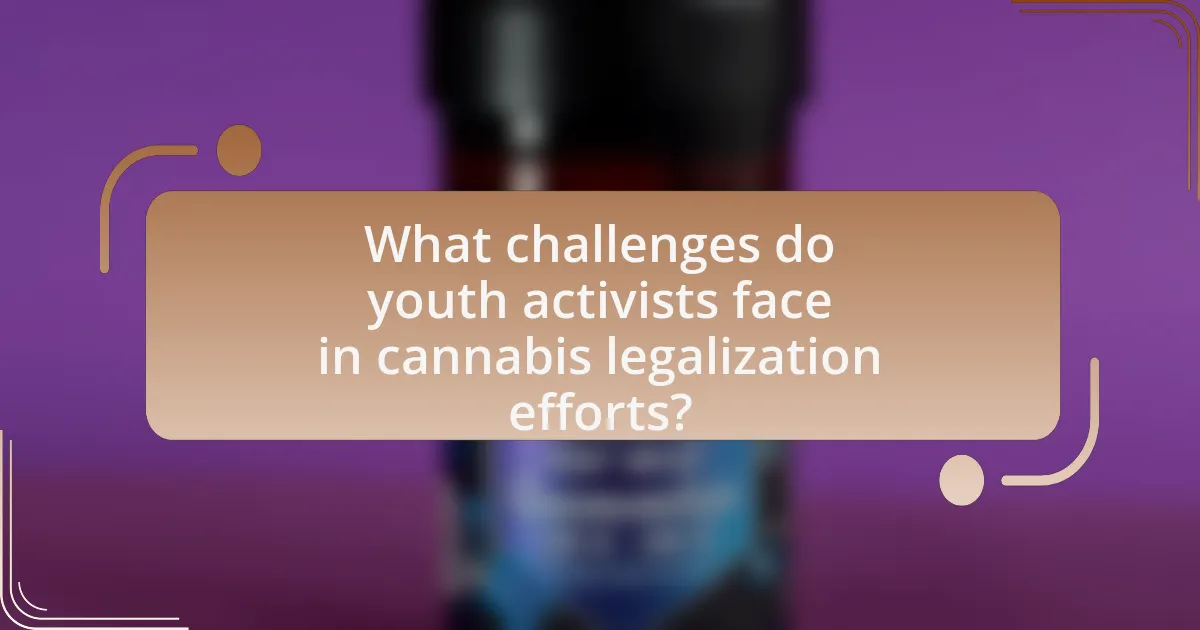
What challenges do youth activists face in cannabis legalization efforts?
Youth activists face significant challenges in cannabis legalization efforts, primarily due to legal restrictions, societal stigma, and limited access to resources. Legal restrictions often prevent young activists from fully participating in advocacy due to age-related limitations on voting and lobbying. Societal stigma surrounding cannabis use can lead to negative perceptions of youth involvement, undermining their credibility and influence. Additionally, limited access to funding and organizational support hampers their ability to mobilize effectively and reach broader audiences. These challenges are compounded by the fact that many youth activists lack experience in navigating the political landscape, which can hinder their efforts to effect change.
How do legal barriers affect youth activism in cannabis reform?
Legal barriers significantly hinder youth activism in cannabis reform by limiting their ability to engage in advocacy and participate in policy discussions. These barriers often include age restrictions that prevent young individuals from voting or holding public office, which diminishes their influence in legislative processes. For instance, in many jurisdictions, individuals under 18 cannot vote on cannabis-related ballot measures, thereby excluding a demographic that is often more progressive on drug policy issues. Additionally, legal repercussions for cannabis possession can deter youth from openly advocating for reform, as they may fear legal consequences or social stigma. This creates an environment where youth voices are marginalized, despite their potential to drive change in cannabis legislation.
What are the implications of age restrictions on activism?
Age restrictions on activism significantly limit the participation of young individuals in movements, particularly in contexts like cannabis legalization. These restrictions can hinder the ability of youth to advocate for policy changes, as many legal frameworks prevent those under a certain age from engaging in political processes or public demonstrations. For instance, in the United States, individuals must be at least 18 years old to vote, which excludes younger activists from influencing legislative decisions directly. This exclusion can lead to a lack of representation for the views and needs of younger demographics, who may be more progressive regarding cannabis policies. Furthermore, age restrictions can stifle the development of leadership skills among youth, as they are often unable to take on roles that require public engagement or organizational responsibilities. Consequently, the implications of age restrictions on activism not only affect the immediate ability of young people to participate but also have long-term effects on the evolution of social movements and the inclusivity of democratic processes.
How do societal stigmas impact youth-led initiatives?
Societal stigmas significantly hinder youth-led initiatives by creating barriers to acceptance and participation. These stigmas often manifest as negative perceptions surrounding youth involvement in controversial topics, such as cannabis legalization, leading to diminished credibility and support from adults and institutions. For instance, research indicates that youth activists face skepticism regarding their motivations and capabilities, which can result in reduced funding and collaboration opportunities. A study published in the Journal of Youth Studies highlights that stigmatization can lead to feelings of isolation among young activists, ultimately stifling their ability to mobilize effectively and advocate for change.
What resources are available to support youth activists in cannabis legalization?
Youth activists in cannabis legalization can access various resources, including advocacy organizations, educational materials, and funding opportunities. Organizations such as the National Organization for the Reform of Marijuana Laws (NORML) and Students for Sensible Drug Policy (SSDP) provide training, networking, and campaign support specifically tailored for young activists. Additionally, online platforms like Leafly and High Times offer articles and guides that educate youth on cannabis policy and activism. Grants and scholarships from foundations focused on drug policy reform also support youth-led initiatives, enabling them to engage effectively in legalization efforts.
How can educational programs empower young advocates?
Educational programs can empower young advocates by providing them with knowledge, skills, and resources necessary for effective activism. These programs often include training on advocacy strategies, public speaking, and policy analysis, which equip youth with the tools to engage in meaningful dialogue about cannabis legalization. For instance, research by the National Youth Advocacy Coalition highlights that youth who participate in structured educational initiatives are more likely to understand legislative processes and mobilize their peers effectively. This empowerment leads to increased confidence and a greater ability to influence public opinion and policy decisions regarding cannabis legalization.
What funding opportunities exist for youth-led cannabis initiatives?
Funding opportunities for youth-led cannabis initiatives include grants from organizations focused on social justice, community development, and cannabis reform. For example, the Drug Policy Alliance offers grants aimed at supporting youth activism in drug policy reform. Additionally, the Cannabis Equity Fund provides financial support specifically for initiatives that promote equity in the cannabis industry, which often includes youth-led projects. Furthermore, crowdfunding platforms like GoFundMe and Kickstarter have been utilized by youth-led initiatives to raise funds directly from supporters. These funding sources are crucial for empowering young activists to drive change in cannabis legalization efforts.
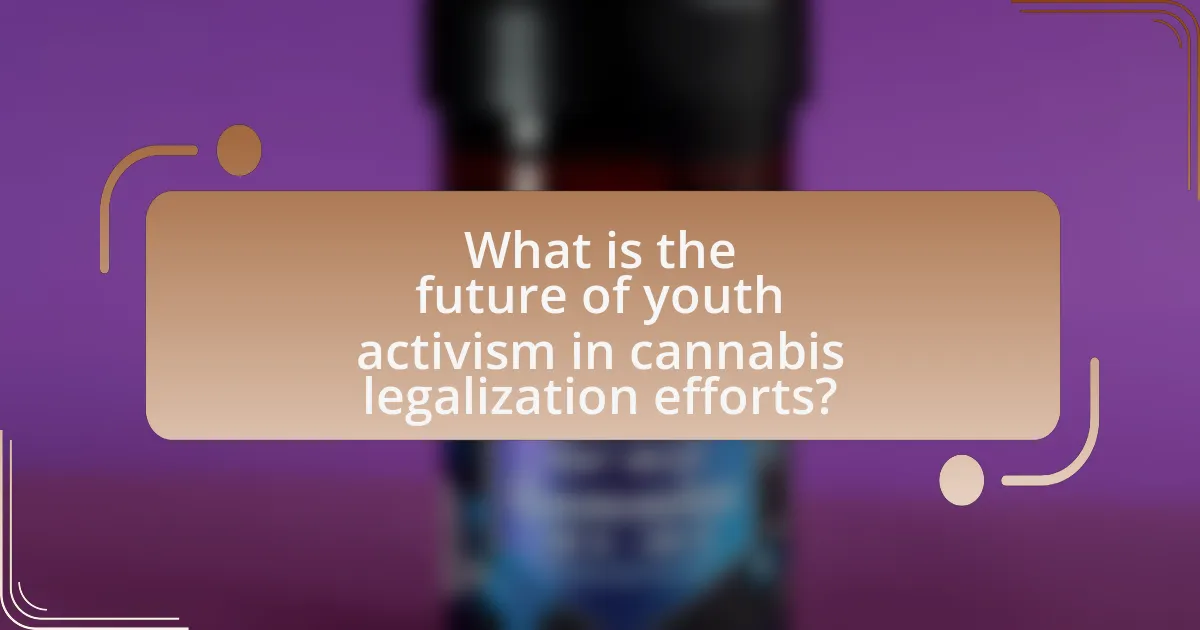
What is the future of youth activism in cannabis legalization efforts?
The future of youth activism in cannabis legalization efforts is poised to grow significantly, driven by increasing engagement and advocacy among younger generations. Youth activists are leveraging social media platforms to mobilize support, share information, and influence public opinion, as evidenced by campaigns like the 2020 “Cannabis for All” initiative, which saw substantial participation from young voters. Additionally, research indicates that younger demographics are more likely to support cannabis legalization, with a 2021 Gallup poll showing that 70% of adults aged 18-29 favor legalization. This trend suggests that youth activism will continue to play a crucial role in shaping policies and driving legislative changes related to cannabis.
How can youth activism evolve to address emerging challenges in cannabis policy?
Youth activism can evolve to address emerging challenges in cannabis policy by leveraging digital platforms for education and advocacy. By utilizing social media and online campaigns, young activists can disseminate accurate information about cannabis benefits and risks, countering misinformation. For instance, the National Organization for the Reform of Marijuana Laws (NORML) reported that youth-led campaigns significantly increased public awareness and support for cannabis legalization in states like California and Colorado. Additionally, youth can engage in grassroots organizing to influence local legislation, as seen in the successful efforts of organizations like Students for Sensible Drug Policy, which mobilized students to advocate for policy reform on campuses nationwide. This combination of digital engagement and grassroots activism positions youth to effectively tackle the evolving landscape of cannabis policy.
What trends are shaping the future of youth involvement in cannabis reform?
Youth involvement in cannabis reform is increasingly shaped by digital activism, educational initiatives, and changing public perceptions. Digital platforms enable young activists to mobilize quickly, share information, and engage in advocacy campaigns, exemplified by movements like the #CannabisReform hashtag on social media. Educational initiatives, such as university programs focused on cannabis policy, empower youth with knowledge and skills necessary for effective advocacy. Additionally, shifting public attitudes towards cannabis legalization, particularly among younger demographics, create a supportive environment for youth-led reform efforts, as evidenced by a 2021 Gallup poll showing that 68% of Americans support legalization, a significant increase from previous decades. These trends collectively enhance the capacity and influence of youth in shaping cannabis policy.
How can technology enhance youth activism in the cannabis space?
Technology can enhance youth activism in the cannabis space by providing platforms for communication, organization, and information dissemination. Social media platforms like Instagram and Twitter enable young activists to share their messages widely, mobilize supporters, and create viral campaigns that raise awareness about cannabis legalization. For instance, the #CannabisCommunity hashtag has been used to connect activists and share educational content, leading to increased public engagement and support for legalization efforts. Additionally, online petitions and crowdfunding platforms allow youth to organize campaigns and raise funds for advocacy initiatives, making activism more accessible and impactful. Data from the Pew Research Center indicates that 95% of teens have access to a smartphone, highlighting the potential reach and influence of technology in mobilizing youth around cannabis issues.
What practical steps can young activists take to influence cannabis legalization?
Young activists can influence cannabis legalization by organizing grassroots campaigns that raise awareness and mobilize community support. These campaigns can include educational workshops, social media outreach, and public demonstrations to inform the public about the benefits of legalization and the harms of prohibition. For instance, a 2021 survey by the Pew Research Center found that 60% of Americans support cannabis legalization, indicating a growing public sentiment that activists can leverage. Additionally, young activists can engage with local lawmakers by attending town hall meetings, lobbying for policy changes, and participating in advocacy groups focused on cannabis reform. This direct engagement can lead to legislative changes, as seen in states like California and Colorado, where youth-led initiatives played a significant role in shaping cannabis policy.
How can individuals effectively advocate for cannabis policy change?
Individuals can effectively advocate for cannabis policy change by engaging in grassroots organizing, educating the public, and lobbying policymakers. Grassroots organizing involves mobilizing community members to raise awareness and support for cannabis reform initiatives, which can lead to increased public pressure on legislators. Educating the public about the benefits of cannabis legalization, including its potential economic advantages and social justice implications, can shift public opinion and create a more favorable environment for policy change. Additionally, lobbying policymakers through direct communication, attending town hall meetings, and participating in advocacy days can influence legislative decisions. Research indicates that states with active advocacy groups have seen more progressive cannabis policies, demonstrating the impact of organized efforts in shaping legislation.
What best practices should youth activists follow to maximize their impact?
Youth activists should focus on building coalitions, leveraging social media, and engaging in grassroots organizing to maximize their impact. By forming alliances with established organizations, activists can amplify their voices and resources, as seen in successful campaigns like the legalization efforts in various U.S. states where collaboration led to significant legislative changes. Utilizing social media platforms allows for rapid dissemination of information and mobilization of supporters, evidenced by the viral campaigns that have successfully raised awareness and support for cannabis legalization. Grassroots organizing fosters community involvement and empowers individuals to advocate for change at local levels, which has proven effective in influencing public opinion and policy.
